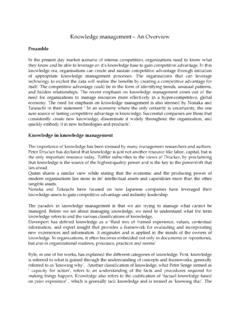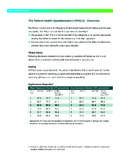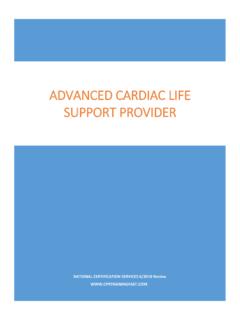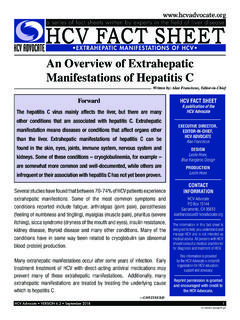Transcription of Service Measurement Index Framework Version 2 - csmic.org
1 CSMIC Carnegie Mellon University Silicon Valley Moffett Field, CA USA Service Measurement Index Framework Version July 2014 SMI Framework Version 2011 - 2014 Carnegie Mellon University 2 Introducing the Service Measurement Index (SMI) The Service Measurement Index (SMI) is a set of business-relevant Key Performance Indicators (KPI's) that provide a standardized method for measuring and comparing a business Service regardless of whether that Service is internally provided or sourced from an outside company. It is designed to become a standard method to help organizations measure cloud-based business services based on their specific business and technology requirements.
2 The Service Measurement Index is currently being developed by the Cloud services Measurement Initiative Consortium (CSMIC). The SMI is a hierarchical Framework . The top level divides the Measurement space into 7 Categories. Each Category is further refined by 4 or more Attributes. Then within each Attribute a set of KPI s are defined that describe the data to be collected for each measure/metric. Some of these KPI s will be Service specific while others will apply to all services (BPaaS, IaaS, PaaS, and SaaS). Version of the CSMIC SMI contains the first 2 levels of this hierarchy, the Categories and Attributes.
3 Work is currently ongoing on the definition of the KPI s and measures related to several attributes. See Figure 1: High-Level Overview to the right for a high-level overview of the SMI. A more detailed view (Figure 2: Detailed View) is provided on the last page of this document. For more information see: The Attribute definitions provided here are all written using these basic terms. Client An organization that acquires one or more cloud-based services for its users Cloud Service Provider (CSP) An organization that delivers one or more cloud-based services to one or more clients.
4 Service A set of functions or capabilities made available to a group of users by a cloud Service provider, in order to achieve client objectives. SLA ( Service Level Agreement) An agreement between a cloud Service provider and a client documenting quantitative Service level commitments. User The people that interact directly with a Service . SMI Framework Version 2011 - 2014 Carnegie Mellon University 3 Definitions Accountability This category contains attributes used to measure the properties related to the cloud Service provider organization. These properties may be independent of the Service being provided.
5 Attribute SMI Attribute Definition Auditability The ability of a client to verify that the cloud Service provider is adhering to the standards, processes, and policies that they follow. Compliance Standards, processes, and policies committed to by the cloud Service provider are followed. Contracting experience Indicators of client effort and satisfaction with the process of entering into the agreements required to use a Service . Ease of doing business Client satisfaction with the ability to do business with a cloud Service provider. Governance The processes used by the cloud Service provider to manage client expectations, issues and Service performance.
6 Ownership The level of rights a client has over client data, software licenses, and intellectual property associated with a Service . Provider business stability The likelihood that the cloud Service provider will continue to exist throughout the contracted term. Provider Certifications The cloud Service provider maintains current certifications for standards relevant to their clients' requirements. Provider Contract/SLA Verification The cloud Service provider makes available to clients SLAs adequate to manage the Service and mitigate risks of Service failure. Provider Ethicality Ethicality refers to the manner in which the cloud Service provider conducts business; it includes business practices and ethics outside the scope of regulatory compliance.
7 Ethicality includes fair practices with suppliers, clients, and employees. Provider Personnel Requirements The extent to which cloud Service provider personnel have the skills, experience, education, and certifications required to effectively deliver a Service . Provider Supply Chain The cloud Service provider ensures that any SLAs that must be supported by its suppliers are supported. Provider Support The extent to which the cloud Service provider includes or makes available assistance to the client in their efforts to use the Service , including answering questions about the Service and working around or correcting any problems that may arise.
8 Sustainability The impact on the economy, society and the environment of the cloud Service provider. SMI Framework Version 2011 - 2014 Carnegie Mellon University 4 Agility Indicates the impact of a Service upon a client's ability to change direction, strategy, or tactics quickly and with minimal disruption. Attribute SMI Attribute Definition Adaptability The ability of the cloud Service provider to adjust to changes in client requirements. Elasticity The ability of a cloud Service provider to adjust its resource consumption for a Service at a rapid enough rate to meet client demand.
9 Extensibility The ability to add new features or services to existing services . Flexibility The ability to add or remove predefined features from a Service . Portability The ability of a client to easily move a Service from one cloud Service provider to another with minimal disruption. Scalability The ability of a cloud Service provider to increase or decrease the amount of Service available to meet client requirements and agreed SLAs. Assurance This category includes key attributes that indicate how likely it is that the Service will be available as specified. Attribute SMI Attribute Definition Availability The appropriateness of the Service availability window, as well as the likelihood that the availability window will actually be provided to clients.
10 Maintainability Maintainability refers to the ability for the cloud Service provider to make modifications to the Service to keep the Service in a condition of good repair. Recoverability Recoverability is the degree to which a Service is able to quickly resume a normal state of operation after an unplanned disruption. Reliability Reliability reflects measures of how a Service operates without failure under given conditions during a given time period. Resiliency/Fault Tolerance The ability of a Service to continue to operate properly in the event of a failure in one or more of its components.






